Opinion
MOHAMMED MAIGARI DINGYADI: A QUINTESSENTIAL PATRIOT JOINS PRESIDENT TINUBU’S RENEWED HOPE CABINET
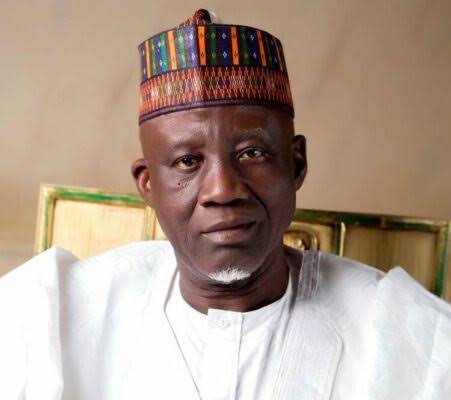
BY. DELE AILEMEN
Having been involved for most of my life in working class and progressive activism, and journalism nationally and globally, I must admit my hopefulness at the inspirational nomination of Hon. Mohammed Maigari Dingyadi for the Labour and Employment portfolio. These are simultaneously defining and trying times for President Bola Tinubu administration. Undeniably, the helms of the labour and employment is an existential artery for oxygenerating our national socio-economic health. The choice of President Tinubu for the phenomenal task of the ministry is vitally consequential.
After months of speculations and serial rumour, President Tinubu announced changes and rejuvenation in the federal executive council. In swift action, he named seven ministerial nominees supplanting five others. As expected, the ministerial-shake up has elicited energetic comments in the media and other platforms.
While some have vilified and minimized the efforts of Tinubu saying that the changes were not far reaching, others believe that the administration deserves commendation for the courage to effect potentially profound reforms.
Amid the cacophony of talks about the cabinet changes, there are indisputable silver linings of positivity; for the first time, since the birth of the fourth republic in 1999, Tinubu attached portfolios to the list of ministerial nominees for the Senate screening. With this audacious decision, the President has responded to the yearning of Nigerians who have clamoured for such feature in the nomination process in a way that enables the Senate to engage in direct interrogation and thoughtful scrutiny of every nominee.
To every discerning, and informed mind interested in national growth and development, the labour and employment portfolio is very paramount. In developed climes, necessary, and imperative details are devoted to who manages this strategic ministry in every administration. From empirical studies, countries like the United States, United Kingdom, and Australia conscious of the importance of labour and employment to growth and development ensure that whoever heads the sector must possess criterion fitting for necessary collaboration, and realistic synergies between the government, organised labour, and private sector.
For every Nigerian that has followed the distinguished public service career of Alhaji Mohammed Maigari Dingyadi, his choice as a ministerial-nominee by Tinubu is well-deserved. Also, his expected deployment to labour and employment is akin to putting a round peg in round hole. Indeed, it is apposite to commend Tinubu for the nomination which depicts his commitment, and determination towards having all-round, all-inclusive, robust, and results-yielding labour-government relations as necessary impetus for national development.
In his over four decades post-graduation career as a dedicated civil servant; consummate administrator; resourceful security expert; responsive lawmaker; altruistic politician; and serial philanthropist, Dingyadi has carved enviable niches for himself. Deploying boundless energies, bountiful courage, consistent candour, and ceaseless competencies in the discharge of every duty, assignment and responsibility, Dingyadi has recorded unblemished records of excellence, and achievements in his numerous services to the country, state, community, and humanity.
That Tinubu has found him worthy to oversee the labour and employment portfolio speaks volumes about his high-rating, and affirmation of his achievements as the police affairs minister, between August 2019 and May 2023 in the Buhari administration. That he is the sole nominee; from the last government to deserve a positive look-in confirms, in many ways the acknowledgement of his performances in the last administration, and recognition of his consistency, character, capabilities, and competencies.
From available records, Dingyadi is arguably, the best police affairs minister since 1999. Under his leadership, the Nigerian Police Force, and other agencies such as the Police Academy, Wudil; Police Training Colleges; and Nigerian Police Trust Fund witnessed improved operations, and service deliveries. Numerous initiatives were emplaced towards capacity building, ethical standardization, and operational sustainability of agencies under the ministry.
Under his supervision, the police affairs ministry posted many laudable achievements including:- presidential assent to the elevation of the Police Academy, Wudil to a full-fledged degree awarding institution; presidential assent to the establishment of the federal government Public-Private Security Fund; review, and upgrade of training curriculum for police institutions to align with contemporary policing realities; full implementation of the Integrated Payroll and Personnel Information System (IPPIS) at all agencies; establishment of the Interpol Cybercrime Reportorial Platform; commissioned the NPF Crime and Incident Database Centre; establishment of the NPF Cybercrime Control Centre; deployment of ICT-based apparatus at strategic commands and units in fighting crime; improved operational apparatus of the Interpol Cybercrime Unit; and launch of “NPF Rescue Me” application.
Dingyadi also ensured that officers, personnel, and staff of the ministry, and agencies benefited from various operational, empowerment, and welfare initiatives towards encouraging commitment, and service deliveries at all levels. These included:- construction, renovation and rehabilitation of police stations and barracks at FCT, Lagos, Gombe, Kebbi, Abia, Plateau, Edo, Ogun, Borno, Sokoto, Niger, Bayelsa, and other states; construction and rehabilitation of hospitals and health centres; provision of operational vehicles, arms and ammunition, and others; provision of intelligence equipment at Abuja Force Headquarters, and Headquarters Annex in Lagos; provision of medical equipment, kits, and other consumables; recruitment of about 100,000 constables through open, transparent, and credible processes; recruitment of young WASC holders into the Nigerian Police Academy, Wudil for Assistant Superintendent of Police (ASP) training; and many others.
Given his broad-based experiences, and multi-disciplinary competencies which has attracted national and global recognition over the years, Dingyadi is best-suited to be the labour and employment minister. As a top civil servant in Sokoto state where he rose to the position of Secretary to State Government; having functioned as Permanent Secretary in the Career, Special Services, and other strategic ministries, he had excellent working relationship with civil servants such that at no time did workers embarked on any strike action. As a federal lawmaker, he played useful roles in every legislative intervention with the organised labour. At the ministry of police affairs, labour unions, and workers had productive synergies with him. One is confident that leveraging on his manifested love for humanity, and the general well-being of people, Dingyadi would help advance smooth, better, and fruitful government-labour relations towards immense benefits to the Nigerian worker, and the nation.
* DELE AILEMEN, Co-Convener, 2002 Los Angeles (California)People’s Convention; and Chairman, defunct Bendel State Council of Nigeria Union of Journalists writes from Benin.
Opinion
5G,IoT and AI to boost global GDP by 2030

By Sonny Aragba-Akpore
With Mobile technologies and services now generating around 5.8% of global Gross Domestic Product (GDP) a contribution that amounts to about $6.5 trillion of economic value, there are strong projections that by 2030, this figure will rise to almost $11 trillion, or 8.4% of GDP.
Global System of Mobile Communications Association (GSMA) says much of this will be driven by countries around the world increasingly benefiting from the improvements in productivity and efficiency brought about by the increased take-up of mobile services and digital technologies, including 5G, Internet of Things (IoT) and Artificial Intelligence (AI).
The GSMA recently introduced the 5G Connectivity Index to provide insights into 5G performance in 39 markets in order to encourage informed decision-making.
In terms of Economic Impact,
the GSMA emphasizes the economic benefits of mobile technologies and services, including 5G, projecting that they will contribute significantly to GDP growth by 2030.
“The GSMA provides specific reports and analyses on 5G in different regions, such as Sub-Saharan Africa, Asia ,Middle East among others highlighting the progress and challenges of 5G deployment in specific areas.”
In Sub Saharan Africa for instance with particular attention on Nigeria,South Africa,Egypt,Kenya and Botswana among others some measure of progress in deployment has been recorded.
The rollout of 5G has brought immense benefits across multiple industry sectors, particularly those involving internet of things (IoT) and artificial intelligence (AI) applications in which the real-time transfer of data is crucial.
More broadly, the adoption of 5G is expected to accompany increased data use across the globe, with forecasts anticipating mobile data traffic of over 300 exabytes per month by 2030, more than twice the volume consumed in 2024 according to Statista.
And with a third of global population expected to be covered by this fifth generation (5G) networks ,a technology that has defined new ways of communication by 2025 ,GSMA
says the technology has surpassed growth projections of all times.
“5G subscriptions increased by 163 million during the third quarter 2024 to total 2.1 billion. 5G subscriptions reached close to 2.3 billion by the end of 2024 accounting for more than 25 percent of all global mobile subscriptions.
“4G subscriptions continue to decline as subscribers migrate to 5G” according to GSMA.
As of the first quarter of 2024, there were nearly two billion 5G connections worldwide, with 185 million new additions. This is expected to grow to 7.7 billion by 2028.”
Statistics show that 5G is the fastest-growing mobile broadband technology, reaching 1.5 billion connections by the end of 2023.
It only took four years to reach this number, compared to 10 years for 3G and more than five years for 4G.
“5G is more than a new generation of technologies; it denotes a new era in which connectivity will become increasingly fluid and flexible.5G Networks will adapt to applications and performance will be tailored precisely to the needs of the user” GSMA submits.
By covering one-third of the world’s population , impact on the mobile industry and its customers will be profound according to GSMA.
To deepen the spread of 5G ,GSMA is working closely with the mobile operators pioneering 5G, “by engaging with governments, vertical industries including automotive, financial services, healthcare providers, transport operators, utilities and other industry sectors to develop business cases for 5G.”
And In order to accelerate the growth and spread, many operators are said to be deploying
AI technology as part of an integral part of telecoms operators’ strategic and operational plans.
“Operators are making important advancements in the deployment of AI technology, which is serving as a transformative force shaping the telecoms industry. By deploying autonomous AI-based systems, operators can enhance operational efficiency, customer satisfaction and security, while also creating new revenue opportunities”.
China, South Korea, the United Kingdom, Germany, and the United States are the leading countries with robust 5G coverage in the world.
Since the first commercial launches of the fifth generation of mobile networks in late 2018, these five countries have emerged as leaders because multiple companies in these countries have deployed networks and are selling compatible devices. Countries including Switzerland and Finland are up and comers in 5G development, though they have limited deployment.
In China there are three Companies leading in deployment.
The world’s largest 5G network was launched by the three largest Chinese network operators Oct 31, 2019, according to the state-run news agency Xinhua. These are China Mobile, China Unicom, and China Telecom which all activated their networks in less than five months after they were issued 5G licenses.
Each of the network operators offered their 5G services at $18 per month in 50 Chinese cities at the beginning of the launch.
GSMA expects 36% of China’s mobile users to be using 5G by 2025. That’s about 600 million subscribers, who would also make up 40% of the entire global 5G market by this year.
This is all despite efforts made by the United States government to hamper the progress of Chinese vendors, though those efforts may affect how Chinese companies may expand into the global market.
In South Korea,SK Telecom and Korea Telecom run as the main competitors for the South Korean 5G market.
SK Telecom acquired spectrum in the 3.5 GHz and 28 GHz frequencies to prepare for deploying 5G.
In April of 2019, the Enterprise claimed to be the first mobile carrier in the world to launch 5G services to work on 5G smartphones. SK Telecom asserted an edge over rival Verizon, as the former launched 5G services available at the same time as Samsung Galaxy S10 5G smartphone launched in South Korea. Verizon launched mobile 5G services in the U.S. before a 5G enabled smartphone was available to U.S. consumers.
SK Telecom also conducted tests with a 5G Standalone (SA) Core (a core not reliant on the 4G network) for their 5G network in cooperation with Samsung Electronics.
The world’s largest 5G network was launched by the three largest Chinese network operators Oct 31, 2019, according to the state-run news agency Xinhua. These are China Mobile, China Unicom, and China Telecom which all activated their networks in less than five months after they were issued 5G licenses. Each of the network operators offered their 5G services at $18 per month in 50 Chinese cities at the beginning of the launch.
“What we are seeing is a concerted effort by the Chinese — the operators, vendors, and government regulators — to deploy 5G as quickly as possible,” Chris Nicoll, principal analyst at ACG Research, pointed this out in a November 1, 2019 SDxCentral article.
With all of these players working together, the three network operators had collectively deployed nearly 86,000 5G base stations peaked over 130,000 by the end of 2019. The latter number breaks down into China Unicom and China telecom, with each planning to install 40,000 base stations, and the market leader China Mobile to install 50,000.This was the projection by 2019 but they have since overshot this by the beginning of 2024.
The International Telecommunication Union (ITU), says 5G coverage reached 40% of the world’s population in 2023 with an uneven coverage and distribution with developed countries having more coverage than low-income countries:
In Europe ,68% of the population is covered and
Americas had 59% of the population covered while
Asia-Pacific has 42% of the population covered as at 2023.
Arab States have 12% of the population covered.
Commonwealth Independent of States (CIS) had 8% of the population covered.
ITU figures show Africa,s coverage rose to 10 % of the population by 2023 .
The ITU also notes that 90% of the world’s population is covered by 4G, but 55% of people without access to 4G live in low-income countries because In low-income countries, 3G is often the only technology available to connect to the Internet.
The ITU develops and adopts international regulations and global standards to enable the harmonization and implementation of broadband mobile networks.
In Africa, around a dozen nations have launched services including Botswana, Kenya, Mauritius, Madagascar, Nigeria, Seychelles, South Africa, Tanzania, Togo, Zimbabwe, and Zambia but Africa is a patchwork of 54 countries.
And penetration is predicted to be slow.
By 2027, Ericsson predicts that 80 percent of phone users in Europe will have 5G service.
At the same time, 5G subscriptions in Africa, home to 1.4 billion people, May stagnate at a little over 10 percent. Why will so few people in Africa get access to 5G services?
China, South Korea, the United Kingdom, Germany, and the United States remain the leading countries with robust 5G coverage in the world.
While many countries are already providing robust services,Africa remains on the outskirts of 5G services.
The countries in Africa that have launched 5G networks, include South Africa with its roll out
In March 2022, when the Independent Communications Authority of South Africa (ICASA) sold spectrum across several bands.
In Nigeria,MTN rolled out commercial 5G services in Lagos in 2022, with other roll out in Abuja, Port Harcourt, Ibadan, Kano, Owerri, and Maiduguri among others.
MTN Congo announced that it was the first country in Central Africa to deploy 5G.
In Botswana Orange deployed 5G technology to provide new services in the Gaborone and Francistown regions.
Other countries in Africa that have launched 5G Fixed Wireless Access (FWA) services include: Angola, Kenya, Zambia, and Zimbabwe.
Analysts say “5G’s potential is growing due to its ability to deliver fiber-like speeds. However, there are still challenges in the region, such as:
Urban areas are reaching their maximum capacity whereas a large portion of the population lives in rural areas.
This explains why 5G adoption in the sub-Saharan region is currently below six percent “
Analysts report that 5G deployment in Africa faces many challenges, including Spectrum assignment,regulatory issues,infrastructure,security,financial resources among others.
“Spectrum is a limited resource that is already in use by other services, such as TV broadcasters and satellite operators. Governments need to open up frequencies and grant 5G licenses at reasonable prices. “
Infrastructure is another major challenge.
“5G networks require a large initial investment, including expensive devices, antennas, and Radio Access Network (RAN) hardware. The infrastructure needs to be fiberized to support 5G services.
Regulatory conditions also serve as challenges to deployment.
For instance “regulatory authorities may not have started the process for licensing and granting frequencies in the right portion “
“Most of the equipment and devices required for 5G deployment need to be imported.”
There are also security challenges that make
5G technology vulnerable to cyber security threats, such as tracking calls and exposing user locations.
Opinion
Right of Reply: THE PUNCH AND BUSYBODY BUSINESS

The recent declaration of a State of Emergency in Rivers State has triggered diverse commentaries from a wide range of Nigerians.
Almost everyone hailed the presidential proclamation because of the visible threat to law and order in the state at the time the action was taken. Of course, there were a few naysayers who read political meanings into an otherwise sincere and prompt intervention.
One such negative interpretation is the position taken by the Editorial Board of The Punch newspaper. In one of its editorials published on the matter, the national daily claimed that the entire crisis was caused by what it described as “the needless meddlesomeness in the governance of the state by its former governor and Tinubu’s Federal Capital Territory Minister, Nyesom Wike….” It is unfortunate that this narrative and others like it have become commonplace in the media space.
How did the Editorial Board of a reputable newspaper arrive at such a conclusion? Their claim that the Sole Administrator, Admiral Ibok Ete Ibas (rtd), has been acting a script purportedly written by the Minister of the Federal Capital Territory, Nyesom Wike, is also faulty and has no iota of truth.
They also faulted the sacking of all political appointees who served in Governor Siminalayi Fubara’s administration, insinuating that their replacements were drawn from Wike’s political camp. Again, nothing can be further from the truth.
Since his appointment as the Sole Administrator of Rivers State, Admiral Ibok Ete Ibas has been running the state with the abundant human resources available in the state and has not imported anybody from outside the state. Did the Editors of The Punch really expect him to run the administration with the politicians loyal to the suspended governor?
Do they not know that the crop of political appointees who served Fubara would have found it difficult to work with the Sole Administrator?
Certainly, they know the truth, but they have chosen to stoke the fire to generate more tensions in Rivers State.
Certain interests might have commissioned this editorial to cast aspersions on the Sole Administrator and raise doubts about his capacity to run the state.
It may also have been the handiwork of Wike’s political detractors, the man whom many politicians love to hate for no other reason than envy and jealousy.
We urge the Punch newspapers to seek a better mode of intervention in the political situation and not dwell on innuendos and unsubstantiated allegations against certain political actors in order to blackmail them.
Dr Ike Odogwu
Opinion
“Chief. Dr. Ekuogbe Akpodiete; A Philanthropist, Lawyer, and Statesman”
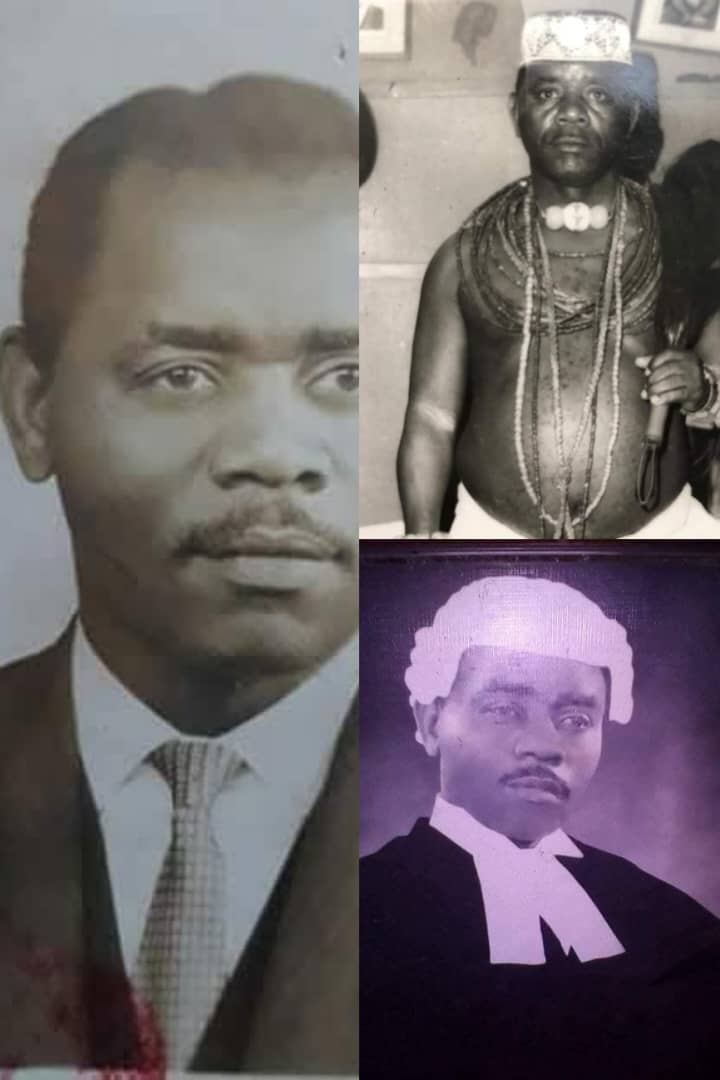
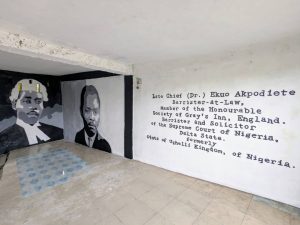
In a life of achievement, Chief Ekuogbe Akpodiete popularly called the Duke by his contemporaries in the UK was an assessment clerk, post office clerk, a court interpreter, an educationist, a business man, a political party chieftain, a Barrister and Solicitor, a Magistrate, the Otota (the Prime Minister) of Ughelli kingdom which is the highest traditional chieftaincy office that underpin the royal office of the Ovie of Ughelli Kingdom.
He was a trail blazer, a strict disciplinarian, a lover of people, and a philantropist. He saw to it that people lived in peace and happiness.
Born on the 4th of April, 1924, to parents cut from an industrious mould, Chief Ekuogbe Rowland Gregory Akpodiete took zealously to education that neither his mother Ughweriaka who was a trader, nor his father Akpodiete who was a farmer had.
He attended the Native Authority Primary School, Ughelli, and Enitona High School, Port Harcourt, for his secondary school education.
He thereafter had a brief teaching career in primary schools in Ofuoma near Ughelli, he worked as a process clerk in the then Sapele Township Department between 1950 and 1953, serving at the same time as an interpreter in the local courts.
He proceeded to the United Kingdom to seek the proverbial Golden Fleece where he worked and paid his way through, studying Law. He was admitted into the Honourable society of Gray’s Inn, England, in 1965, and shortly after, he returned home to Nigeria and attended the Nigerian Law School. He was called to the Nigerian Bar in 1966. He immediately started practice in Lagos. However, his practice in Lagos was regrettably abridged by the Nigerian Civil War, which drove him to his hometown Ughelli in 1967, where he continued to practise among his kith and kin as the first Legal Practitioner.
Chief Ekuogbe Akpodiete established himself in Ughelli. After the civil war, he served in the now defunct Mid-western State Judiciary from 1972 to 1975 as a Magistrate.
He was conferred with the chieftaincy title of Urhukperovie of Ughelli kingdom (the light of the King) by the then reigning Ovie of Ughelli, His Royal Highness Oharisi II of blessed memory in 1977.
In the quest for more knowledge, he went back to England for his Master’s degree in law (LL.M) and later a Ph.D. at the University of Warwick.
He was awarded an honourary doctorate degree (Ph.D) by Tenesse Christian University from the United States of America in 1991.
He became the Otota (the Prime Minister) of Ughelli Kingdom in 1986, an office he occupied until his demise on 9th April 1995.
Chief Ekuogbe Akpodiete was also politically involved. In the heady days of the Awolowo-led Unity Party of Nigeria, he was the party’s legal adviser in Ughelli and was on hand to assist during Chief Obafemi Awolowo’s campaign hosting in Ughelli and its environs.
In view of his love for people and entertainment, he established a popular cinema house, one of the first in Ughelli, known as REGA cinema, coined from his names, alongside an entertainment place called Unutakunu (people talk to people).
Chief Ekuogbe Akpodiete was blessed with wives and many children, grandchildren, and great grand children.
Mr. Olotu Akpodiete, PhD
Executive Director
Olotu & Ekuogbe Rowland Akpodiete foundation
-
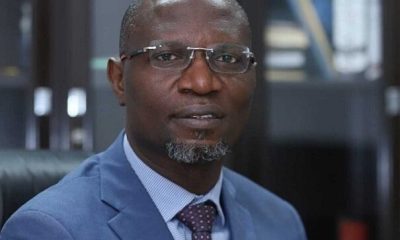
 News24 hours ago
News24 hours agoSAD! SEC DG says “we can’t recover N1.3trn Nigerians lost to CBEX ponzi scheme”
-
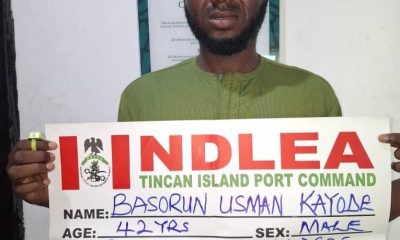
 News22 hours ago
News22 hours agoNDLEA nabs bandits supplier with drugs concealed in private part(Photos)
-

 News14 hours ago
News14 hours agoIsrael’s remote controlled bulldozers breaking ground in Gaza war
-

 News4 hours ago
News4 hours agoRetirees with outstanding loans may lose property – FG
-

 Sports16 hours ago
Sports16 hours agoEPL Results: Chelsea Boost UCL Hopes, Arsenal Win Big, Man United Lost
-
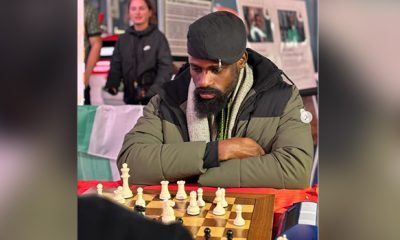
 News14 hours ago
News14 hours ago70-hour Chess Marathon: Onakoya reportedly breaks record set by Norwegians
-

 Sports17 hours ago
Sports17 hours agoBREAKING! Arsenal hammer relegation Bound Ipswich 4-0
-

 News24 hours ago
News24 hours agoNUJ-FCT Chairman Urges Journalists to Embrace Spirit of Easter






